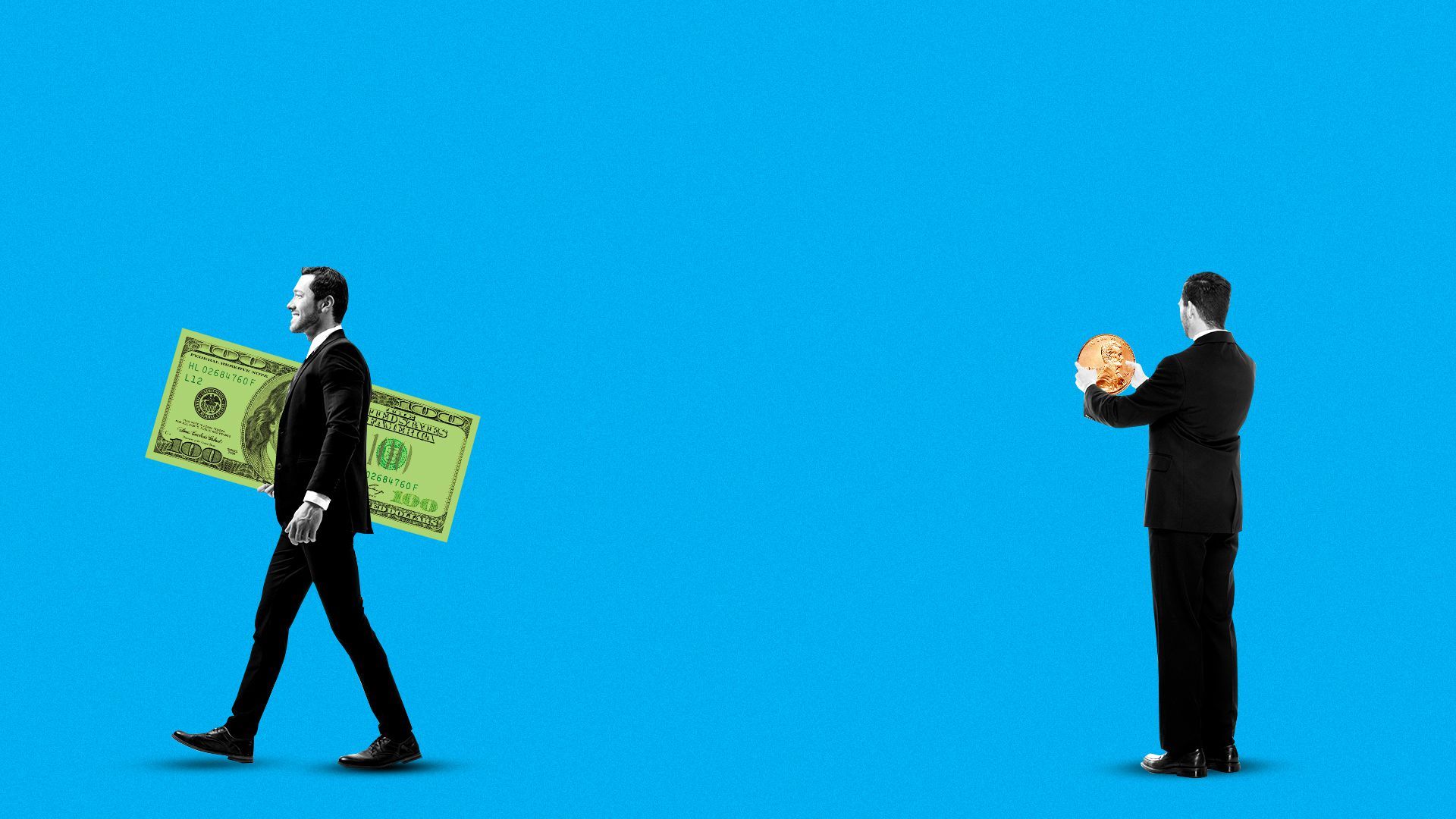Plus, bracing for the Archegos test | Monday, March 29, 2021
| | | | | | | Presented By NetJets | | | | Axios Markets | | By Dion Rabouin ·Mar 29, 2021 | | Good morning! Was this email forwarded to you? Sign up here. (Today's Smart Brevity count: 891 words, 3 minutes.) 🎙 "Resentment is like drinking poison and then hoping it will kill your enemies." - See who said it and why it matters at the bottom. | | | | | | 1 big thing: Economists bullish on Biden's $3T infrastructure plan |  | | | Illustration: Aïda Amer/Axios | | | | Economists are becoming positively giddy about the potential for economic growth this year as President Biden and Congressional Democrats look set to push forward a $3 trillion infrastructure bill. What we're hearing: "Stimulus helps build the bridge for the recovery to reach the other side, but an investment in infrastructure is the fuel to jump start the economic engine," Beth Ann Bovino, U.S. chief economist at S&P Global, says in an email. - S&P predicts Biden's infrastructure plan will create 2.3 million jobs by 2024, inject $5.7 trillion into the economy — which would be 10 times what was lost during the recession — and raise per-capita income by $2,400.
State of play: Economists at Goldman Sachs again revised up their outlook for growth this year in a Sunday note to clients, predicting real consumption will grow by 9.5% in Q1 and 12.5% in Q2, citing retailer reopenings, the reversal of winter storm effects and a decline in new COVID-19 infections. - Further, they note that OpenTable restaurant reservations are nearing 70% of normal nationwide and are back above their pre-crisis level in Texas.
- They also anticipate the pace of fiscal support to U.S. consumers will accelerate by $1 trillion on an annualized basis (or 5% of GDP) for March and the second quarter, relative to the previous six months.
The big picture: "We have to have a big public works program," Lawrence Baxter, director of the Global Financial Markets Center at Duke, tells Axios. - Baxter compares Biden's proposed new programs to New Deal initiatives like the Blue Ridge Parkway that were created to battle unemployment following the Great Depression.
- "They're not daring to call it that because that would be a lightning rod," he adds.
Beneath the surface: A historically high number of Americans are struggling despite what appears to be a recovering economy. - According to the Census Bureau's latest Household Pulse Survey more than 9 million renters are behind on their rent payments and at risk of being evicted, while around 11% of renters say they have no confidence they'll be able to pay next month's rent. (That number jumps to 25% for Americans with a high school diploma or less.)
- A recent CoreLogic report finds homebuyers are consistently relocating because of cost, moving from cities like Los Angeles, New York and Miami to cities like Riverside, Calif., Myrtle Beach and Tampa.
- The Census Bureau also found that 19.2% of U.S. adults are expecting a loss of employment income in the next four weeks, while 10.7% said they don't have enough to eat.
|     | | | | | | 2. Catch up quick | | New U.S. Trade Representative Katherine Tai says the U.S. isn't ready to lift tariffs on Chinese imports in the near future but might be open to trade negotiations with Beijing. (WSJ) Year-over-year profits at China's industrial firms rose 179% in the January-February period. (Reuters) The container ship that has been blocking the Suez Canal for almost a week is now partially refloated but the canal has not yet reopened for ship traffic, despite more than 450 ships now either waiting or en route to the canal zone. (Bloomberg) |     | | | | | | 3. Markets brace for the Archegos test |  Data: YCharts; Chart: Axios Visuals Axios Capital author Felix Salmon writes: Has the stock market gotten ahead of itself? That's the question traders are asking heading into Monday's session, in the wake of a dramatic falloff in a handful of stocks owned by a hedge fund manager named Bill Hwang. Driving the news: Hwang was making highly leveraged multibillion-dollar bets on companies including U.S. TV networks ViacomCBS and Discovery. When those stocks started to fall, Hwang's fund, Archegos, was forced to liquidate the positions at any price, and both companies ended up losing about half their value as a result. The big picture: This week's trading is likely to give an indication of how many high-flying stocks have been bid up by debt-fueled speculators like Hwang. - If the strength of the market reflects robust underlying demand, then ViacomCBS and Discovery are likely to bounce back up, and other stocks will be largely unaffected by the turmoil at Archegos.
- If stock prices are the result of a speculative bubble, however, the implosion of Archegos is exactly the kind of catalyst that could spark spectacular drops in many other stocks that have seen impressive run-ups in recent months.
|     | | | | | | A message from NetJets | | NetJets' most popular aircraft model | | |  | | | | NetJets' Cessna® Citation Latitude® is designed with your optimum comfort in mind. A new opportunity: This midsize favorite has a generous amount of cabin space and is now available through the NetJets Card Program™. Explore the world's finest fleet. | | | | | | 4. What it really costs for delivery vs. pickup |  Chart: Axios Visuals Axios Charlotte's Emma Way writes: We're all guilty of it — you've had a long day, your fridge is barren, your stomach is growling. Delivery it is. (Editor's note: Not me. I'd rather go hungry than pay these markups.) Why it matters: Food delivery apps like Uber Eats and DoorDash cost consumers more and tighten already tight margins for businesses, but we've come to rely on them during the pandemic. (Editor's note: Nah.) The cost of the same meal can vary dramatically whether you purchase direct from the restaurant and pick it up, or depending on your app of choice. Here's an example from popular Charlotte pizzeria Inizio for a 16-inch pistachio pizza, chopped Italian salad and tiramisu cannoli. Let's break it down. - The meal costs $3 more on the apps. "The margins [Uber Eats and Postmates] take are unacceptable straight off the menu," Inizio owner Grant Arons tells Axios, so it's very common for a restaurant to up their prices for delivery orders.
- Then, there's the delivery fee, which varies from restaurant to restaurant, app to app, even day to day.
- The kicker is really in the miscellaneous "fees" category — typically billed as service fees — which brings the Postmates meal to nearly $58, about 45% more than pickup.
- And don't forget to tip. It's been a challenging year for all in the service industry, so whether you're ordering delivery or picking up, go for 20%.
Full story: Why we're all paying so much for food delivery |     | | | | | | A message from NetJets | | Multiple ways to fly with NetJets | | |  | | | | The NetJets Card Program™ offers all-inclusive pricing and guaranteed access to the largest fleet in private aviation. Choose from multiple jet card options with the ultimate convenience of NetJets. Discover ways to fly with all-inclusive pricing. | | | | Thanks for reading! Quote: "Resentment is like drinking poison and then hoping it will kill your enemies." Why it matters: On March 29, 1961, Nelson Mandela was acquitted of treason in Pretoria after a four-year trial. | | | | Axios thanks our partners for supporting our newsletters.
Sponsorship has no influence on editorial content. Axios, 3100 Clarendon Blvd, Suite 1300, Arlington VA 22201 | | | You received this email because you signed up for newsletters from Axios.
Change your preferences or unsubscribe here. | | | Was this email forwarded to you?
Sign up now to get Axios in your inbox. | | | | Follow Axios on social media:    | | | | | |







No comments:
Post a Comment